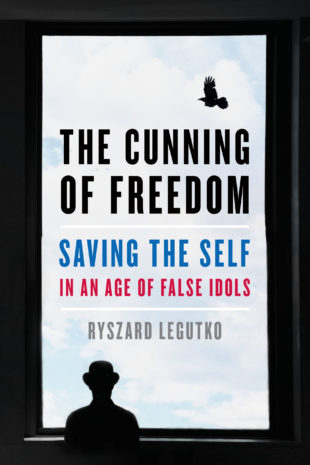
“At the heart of liberty is the right to define one’s own concept of existence, of meaning, of the universe, and of the mystery of human life.” – United States Supreme Court, Planned Parenthood vs Casey
Far from needing tutelage from Americans regarding the proper practice of what now passes for democracy, former Communist Visegrad countries are proving more rooted and tradition-minded than the rest of the West. Indeed, having endured decades of secular totalitarian ideology, Poles and Hungarians may be uniquely positioned to warn and counsel their neighbors regarding the challenges ahead.
Few prospective advisors are better-credentialed than philosophy professor, European parliamentarian, and one-time anti-Communist dissident Ryszard Legutko.
In The Cunning of Freedom Legutko implies that soul-searching is called for on the part of Westerners – especially Americans – who are anxious about current trends. For instance, it is important to admit that “the concept of human rights […] has acquired the status of a political religion in the Western world over the past few decades.” Whatever their intentions, evangelists of this political religion promote what Legutko calls a “thin” view of human nature, meaning they hesitate to make any robust affirmations about who man truly is, what his place in the cosmos might be, or even whether he has a place at all.
Above all else, liberals fear that profound affirmations about man might pave the way for the oppression of one group by another – i.e., “fascism”. What remains when the public order has been stripped to the barest, most superficial form are equal individuals, along with an ostensibly neutral state entrusted with securing said individuals’ identical rights.
In contrast, explains Legutko, classical theory
devoted much more space and attention to a more robust view of human nature which was developed in the Middle Ages and later continued in some currents of modernity. The reason why this strong view predominated is obvious. Contrary to the individualist theories, human societies have never been simply collections of self-contained, isolated individuals, but have been perceived as consisting of beings with larger social, historical, ethnic, and religious identities. Reducing society to a collection of individuals is something we can envisage as a thought experiment or something that might come about in reality, but only through intense social engineering or social disintegration.
One problem, then, is that the notion of freedom which prevailed following the Enlightenment revolved around tearing down obstacles and blocking external influences. However, what might be an obstacle in one instance might serve as a protection or a ladder in others, and in any case it is an utter absurdity to speak of a created being free of external influences.
“One can think of inner freedom not through the analogy of a person who gets rid of an unnecessary burden,” contends Legutko, and “but rather by the analogy of a musical virtuoso who knows he must follow certain rules, but who only after having mastered those rules can achieve perfection in expressing his unique style and interpretation.”
Legutko examines several models of freedom, as found in various archetypes. While each archetype could potentially exhibit noble traits, liberalism has degraded all of them to their very lowest form, so that instead of high-minded philosophers, daring entrepreneurs, visionary artists, and independent-minded aristocrats we find sophists, commercializers, narcissists, and perverts. With few exceptions, these classes have all chosen “the road of conformity.” Almost everyone has accepted the idea that he is defined by his rights – rights secured for him and guaranteed, needless to say, by a technocratic liberal superstate which brooks neither rival authorities nor immaterial values.
Although Legutko is hardly an “America-basher,” and relatively little of his complex and intricate examination of freedom is devoted to the American founding, it is worth zeroing in on precisely those passages which American Catholic might be inclined to gloss over.
In one aside, Legutko addresses the Declaration of Independence and its claim that all men are endowed with inalienable rights: “There is nothing in the Christian religion that would even indirectly supply grounds for such an outlandish contention, nor is there anything of the kind in the history of philosophy.”
Legutko continues,
Yet the authors of this famous document stated clearly: ‘We hold these truths to be self- evident.’ Who held these truths to be self-evident? The only explanation could be that this was a foundational statement expressing the decision of the framers of a new state to treat the idea of inalienable rights as a basic philosophical assumption […] But this meant that American citizens (as well as those from other countries which at a certain point of their development made similar decisions) were henceforth entitled to make extremely strong claims with no regard to any obligations to the state, their community, or even their fellow citizens. Such obligations were always weaker because they came after a political system had been founded, while the rights had existed logically and philosophically prior to any legal, moral, or political opinions.
In other words, per liberal democracy our individual rights come first, and metaphysically precede any duties we may have with respect to our nation, family, neighbors, or God. In Legutko’s estimation, this order of precedence is fatally flawed, and its defects must be acknowledged.
Perhaps he is wrong, but given his experience we should not dismiss him out of hand. There are terrible challenges ahead, and only a fool will think we can face them by repeating the mantras of establishment conservatism. The truth is that emancipated individualism is as much a left-wing revolutionary idea as socialism, and is proving just as much an absurd, dehumanizing failure.
Indeed, when compared to current 21st-century American movements aiming to liberate man not only from nationality and class but from family, sex, and objective truth itself, old-school Marxism seems almost sane and wholesome.
The Cunning of Freedom
By Ryszard Legutko
Encounter Books, 2021
Hardcover, 200 pages
If you value the news and views Catholic World Report provides, please consider donating to support our efforts. Your contribution will help us continue to make CWR available to all readers worldwide for free, without a subscription. Thank you for your generosity!
Click here for more information on donating to CWR. Click here to sign up for our newsletter.






Legutko’s highly ironic observation on the West’s new political religion is certainly a wake-up call from any ‘woke’ slumber and its dream of self-bestowed rights without responsibilities.
“ In one aside, Legutko addresses the Declaration of Independence and its claim that all men are endowed with inalienable rights: ‘There is nothing in the Christian religion that would even indirectly supply grounds for such an outlandish contention, nor is there anything of the kind in the history of philosophy.’”
Finally someone has said what I’ve long thought. America is not a Christian nation. It was founded on Enlightenment principles which are antithetical to Christianity as revealed in Scripture and Tradition. It’s time to speak the truth about the American myth.
The quote from the United States Supreme Court, Planned Parenthood vs Casey case is pretty much a summation of the very essence of Original Sin. After eating the forbidden fruit there was little peace and harmony left in Eden. All sorts of finger pointing. Cain made it clear to Abel what kind of universe he wanted to live in.
Ryszard Legutko is incorrect here. People do have inalienable rights (i.e. inherent and non-transferable), BUT those rights are not absolute nor are they always operative. Circumstances may mean that one person’s right yields to another’s. (e.g. Property in dire necessity.)
With every right there is a corresponding duty. Traditionally, Catholic morality seems to have focused on duties more than rights. One can argue whether this is the best approach. To me and in hindsight, it wasn’t.
There appears to have been very little understanding – or at least emphasis – that a person had a right to resist the unjust state. The attitude makes one think of critics who called Catholics (and maybe Protestants) weak. Just because most people went “along with the program” doesn’t mean that they were morally obliged to. Nowadays, a person could get into very serious trouble (e.g. jail) by behaving in a perfectly moral fashion, while also refusing to “go along.”
De facto law has diverged from morality to a very significant and EVIL extent. A very important insight that I came across is worth mentioning in this connection: Law doesn’t create order, law is order. Lawlessness or unjust “law” is disorder. This apparently was not recognized by Catholic in the past (i.e. 1940s).
“Whatever their intentions, evangelists of this political religion promote what Legutko calls a “thin” view of human nature, meaning they hesitate to make any robust affirmations about who man truly is, what his place in the cosmos might be, or even whether he has a place at all.”
There is no political religion because religion is about God, not politics.
Of course they don’t want to assert much about man! That would mean that humans might be found to have obligations. They prefer to throw around vague positive connotations and catchphrases: “equity,” “equality,” “tolerance,” “My body, my choice,” etc.
I am not very impressed with Ryszard Legutko most of the time. He seems to not offer much in the way of concreteness. He is very good with generalities and criticism, but “the rubber” never “meets the road.” Or if it does occasionally, it barely brushes it. In America, he might be regarded as a RINO.
St. Paul in Romans 1:20 wrote: “20 Ever since the creation of the world his invisible nature, namely, his eternal power and deity, has been clearly perceived in the things that have been made. So they are without excuse;” This points in the direction of self-evident truths.
*
The Declaration of Independence does reference men as being created and that the Creator endows us with unalienable Rights. Do we or do we not posses a God-given human dignity? There is only so much that a state can declare without setting up shop in the churches (see China).
*
With things like the 1619 Project and other nonsense many in the intellectual classes look like they find the American Revolution to be a source of embarrassment. The French, Russian and Chinese Revolutions appear to be more to their taste. If you look at academia it is increasingly adopting totalitarian policies in the running of their campuses. Due process and the rule of law are very unpopular with the self-righteous SJWs that rule the roost. We are in midst of an attempted cultural revolution in the China model. The divided government and the separation of powers of our U.S. Constitution are anathema to the leftist demagogues who are obsessed with power.
Thanks for the review.